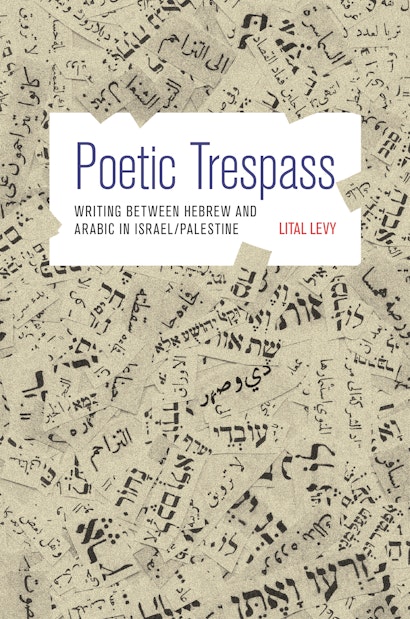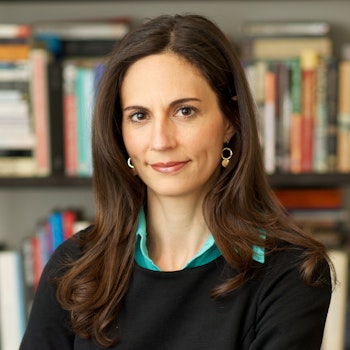A Palestinian-Israeli poet declares a new state whose language, “Homelandic,” is a combination of Arabic and Hebrew. A Jewish-Israeli author imagines a “language plague” that infects young Hebrew speakers with old world accents, and sends the narrator in search of his Arabic heritage. In Poetic Trespass, Lital Levy brings together such startling visions to offer the first in-depth study of the relationship between Hebrew and Arabic in the literature and culture of Israel/Palestine. More than that, she presents a captivating portrait of the literary imagination’s power to transgress political boundaries and transform ideas about language and belonging.
Blending history and literature, Poetic Trespass traces the interwoven life of Arabic and Hebrew in Israel/Palestine from the turn of the twentieth century to the present, exposing the two languages’ intimate entanglements in contemporary works of prose, poetry, film, and visual art by both Palestinian and Jewish citizens of Israel. In a context where intense political and social pressures work to identify Jews with Hebrew and Palestinians with Arabic, Levy finds writers who have boldly crossed over this divide to create literature in the language of their “other,” as well as writers who bring the two languages into dialogue to rewrite them from within.
Exploring such acts of poetic trespass, Levy introduces new readings of canonical and lesser-known authors, including Emile Habiby, Hayyim Nahman Bialik, Anton Shammas, Saul Tchernichowsky, Samir Naqqash, Ronit Matalon, Salman Masalha, A. B. Yehoshua, and Almog Behar. By revealing uncommon visions of what it means to write in Arabic and Hebrew, Poetic Trespass will change the way we understand literature and culture in the shadow of the Israeli-Palestinian conflict.
Some images inside the book are unavailable due to digital copyright restrictions.
Awards and Recognition
- Co-Winner of the 2014 MLA Prize for a First Book, Modern Language Association
- Winner of the 2014 Salo Baron Prize, American Academy for Jewish Research
- Co-Winner of the 2014 Jordan Schnitzer Book Award in Jewish Literature and Linguistics, Association for Jewish Studies
Lital Levy is associate professor of comparative literature at Princeton University, where she teaches Modern Hebrew and Arabic literatures and literary theory.
"Poetic Trespass is a major achievement."—Anna Bernard, Journal of the Society for Contemporary Thought and the Islamicate World
"An important and engaging work that will be of great interest to scholars concerned with Israel/Palestine, Arabic and Hebrew literatures as well as Mizrahi studies."—Pelle Valentin Olsen, Middle East Journal of Culture and Communication
"This is a work of immense accomplishment dedicated to understanding what it means to write in two languages about a condition of life that is, at once, both shared and separate. Lital Levy's critical speculations are careful and courageous as her beautiful prose moves back and forth across the borderline of Israel/Palestine, forging a way of moving toward a solidarity built of sorrow and survival, failure and hope. Read Poetic Trespass and reflect anew on the ethical and poetic possibilities of a translational dialogue in a star-crossed region."—Homi Bhabha, Harvard University
"Erudite and elegant, Lital Levy's Poetic Trespass is a groundbreaking exploration of the unexpected twists and turns in the complex interrelations of Hebrew and Arabic. By rethinking the Hebrew-Arabic nexus and positioning Modern Hebrew literature as an exceptionally rich turf for the study of the ways in which entangled languages affect one another, the book offers an important new perspective on literature's power to reimagine bilingualism. A remarkable consideration of the audacity of writers as different as Anton Shammas and Almog Behar to cross linguistic and political boundaries within the context of the Israeli-Palestinian conflict."—Ilana Pardes, author of Agnon's Moonstruck Lovers: The Song of Songs in Israeli Culture
"Poetic Trespass opens new vistas on the 'no-man's land' between Hebrew and Arabic. Through deeply thoughtful readings of works in Hebrew, Arabic, and uncanny palimpsests of both languages, Lital Levy probes the ways in which literature can reimagine the world beyond the ordinary boundaries of political discourse. With its nuanced attention to questions of translation and mistranslation, of cultural memory and oblivion, Poetic Trespass should be read by anyone interested in pathbreaking work in comparative literary and cultural studies today."—David Damrosch, Harvard University
"Poetic Trespass is one of the most important studies of contemporary Hebrew literature in recent years. Focusing on how a variety of writers in Israel/Palestine transgress the lines that separate Hebrew and Arabic, Lital Levy's compelling, provocative, and productive book enriches our understanding of more than a century of literature in both these languages. It is bound to appeal to scholars across fields who are interested in Jewish studies, the history of Israeli-Palestinian relations, and the history of the Middle East."—Amir Eshel, Stanford University


